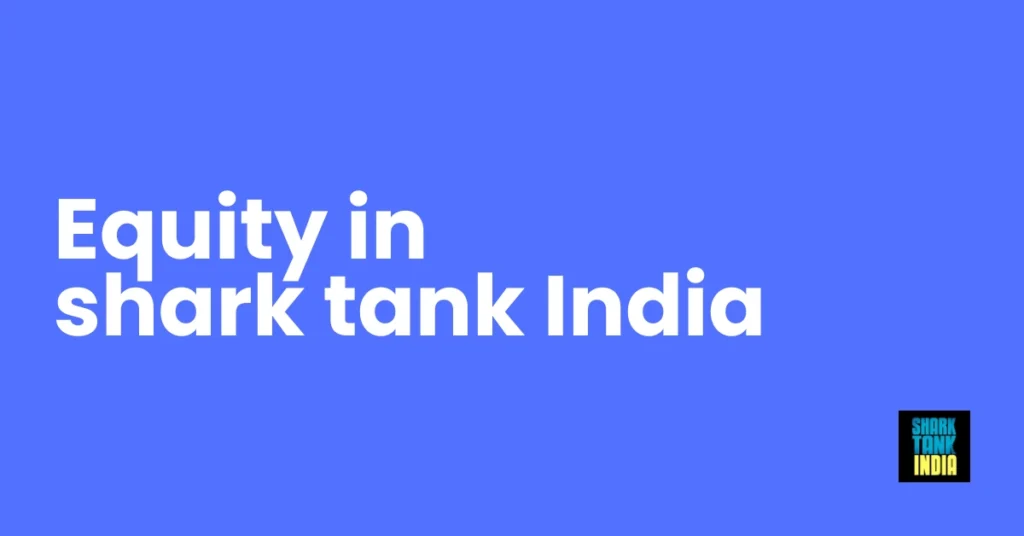What is Equity in Shark Tank India?

If you’ve watched Shark Tank India, you’ve probably noticed how every pitch boils down to two key things: the amount of money the entrepreneur is asking for and the equity they’re offering in return.
But what exactly is equity?
Why do investors care so much about it? And how do they figure out what a business is worth?
Let’s break this down so you understand clearly what is equity in Shark Tank India and how it works.
What is Equity?
Equity is just another form of saying ownership in a business.
With the ownership of equity, you are the owner of your part of the company.
Like when a company is divided into 100 shares and you own 10, then you have 10% ownership of the company.
Now, when startups need some money to grow, most of them do not want loans because of the interest burden.
They instead offer a fraction of their ownership or the equity to investors in exchange for funds.
The catch is that providing equity means sharing control and profits.
That’s why founders have to be very careful about how much they give.
Equity Funding
On Shark Tank India, entrepreneurs present their businesses to the investors and seek finance to scale.
In exchange, they offer investors equity stakes. Here’s how it usually goes:
The Pitch: Founders explain how much money they need and what percentage of their business they are willing to give up in exchange for it.
Valuation Check: Investors use the numbers to figure out if the equity offered matches what they think the company is worth.
The Negotiation: If the deal does not feel right, investors propose new terms, usually demanding a greater equity stake.
For example: ₹50 Lakh for 5% Equity
Imagine a founder offers 5% equity to get ₹50 lakh for his company.
To calculate valuation, take the funding number and divide it by how much equity is being parted with: ₹50 lakhs ÷ 5% = ₹10 cr.
That means the founder believes his company is worth ₹10 cr.
Equity Funding Calculator
What Happens to Equity After Investment?
When a deal is closed on Shark Tank India, the equity structure of the company changes drastically.
In fact, before investment, founders own 100% of the business.
However, once the founder sells a portion of equity to an investor, ownership percentages change to reflect this new partnership.
Let’s take an example: suppose a founder sells 10% of their company to an investor.
After the investment, the founder retains 90% ownership.
If there are co-founders or early-stage investors, then this 90% will be divided among them according to their existing shareholding.
For example: One founder who owned 100% will now own 90% after the investment.
In the two co-founder group holding 50-50 ownership, they will now both end up owning 45% with the sale of 10%.
Beyond the numbers, selling equity also has practical implications.
This means that the investor is now entitled to a voice in certain business decisions, especially if they hold significant equity.
Founders must think carefully about how much control they are willing to share because investors may ask for board seats or veto rights over critical decisions.
The solution is to be balanced by creating funds for growth while preserving a sufficient amount of control for steering the company toward vision.
Smart equity distribution would ensure long-term success of the founders and the investors alike.
Why Equity Matters to Entrepreneurs
One of the most significant decisions a founder can make is equity funding.
It is one of the most powerful ways to raise money for growth without taking any debt, but there are certainly trade-offs.
Advantages of Equity Funding
The absence of repayment obligations is one of the biggest advantages.
Unlike loans, which will always require monthly instalments regardless of your business’s performance, equity funding does not add financial strain.
It’s not just a case of the money, anyway. When an investor like a Shark arrives, you get expertise in addition to their experience.
Their network and business perspective add a lot of benefit from the mentorship offered and guide you through potential difficulties while scaling.
An obvious plus is that they, being a well-established individual, can lend authenticity.
Customers are more likely to convert and other investors line up, too.
The Challenges of Equity Funding
The flip side to giving up equity is that the founders are giving up a slice of ownership.
This dilutes the founders’ equity share in their own company. It’s hard to give up equity in one’s business.
Another thing, the investors are not silent partners; they want returns from their investment.
The performance pressure can be overwhelming for some founders. It almost feels like a loss of independence.
Finally, equity funding is always about finding that perfect balance between gaining the resources needed to expand and still holding control or being on track with one’s vision.
What Influences Company Valuation?
In Shark Tank India, startup valuation is heavily influenced by a number of key factors.
Revenue is a top metric since it shows the current financial health of the business.
Investors also look at market potential-how large the target audience is and whether the startup can dominate that audience.
A scalable and sustainable business model is very valuable.
Profitability with healthy margins is another value addition. These are in addition to the competitive positioning and founder expertise among others.
Read more about how to calculate the valuation of a company in our guide.
Looking Ahead
Equity funding is not just about money, it is about the partnership that drives growth.
For entrepreneurs, it’s an opportunity to bring capital and mentorship together.
For investors, it’s a chance to support promising ideas and share in their success.
Founders must balance aspirations with realistic valuations, while investors seek the right mix of risk and reward.
Essentially, it is about collaboration, with mutual trust and a shared vision, these partnerships could shape the future of businesses.
Disclaimer: The information contained in this blog, The Growth File, is intended for general informational purposes only and does not constitute professional advice. Always consult with a qualified professional before making any business decisions based on the information you find on this blog.
